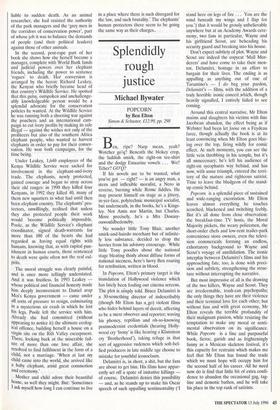Rape, murder, birth
Nicholas Harman
COMING OF AGE WITH ELEPHANTS by Joyce Poole Hodder, £16.99, pp. 270 For years Joyce Poole seems to have thought of herself pretty much as an honorary elephant, although biologically she was a Kenya-reared American. Since elephants care for each other, make cumbrous jokes and, she thinks, indulge in fantasies, she came to have 'no doubt that (they] have conscious thoughts and a sense of self'. This self-knowledge, she argues, qualifies elephants for special regard by that other self-aware species, mankind. In this vein, she skirts the tamer shores of Disneyland.
Then, brutally, she is transported into an altogether tougher country. Her coming of age is imposed by a gang-rape of which she and an unnamed friend, wandering heed- lessly in the bush, were the victims. It is a stunning piece of writing, without drama or self-pity, its reticence as shocking as the terrible event itself. Until then she had gone through life unafraid. Now she fears mankind, and seems to realise that, if elephants are like people, they too can be terrible.
Poole's elephant work was done almost entirely on a single smallish reserve, the Amboseli in Kenya, not (she carefully explains) as an ecologist studying the great beasts' diet and environment, but as an ethologist, watching how they behave. Close study of families and relationships developed her love of the animals and the places they live in, laying the groundwork for the animal-rights stuff in her book's first half. The darker second half, though, is written for those who seriously want to preserve the largest of the land mammals. It should not encourage them to expect success.
In the 1970s the encroachment of settled farmers, the availability of cheap automatic weapons and the high price of ivory com- bined to turn the business of elephant- poaching into mass slaughter, to the profit of politicians and national park officials. Kenya's elephant population dropped from about 167,000 in 1973 to 63,000 in 1979 and around 20,000 by the mid-1980s. Poole saw that it was not much use studying elephant families whose members were liable to sudden death. As an animal researcher, she had resisted the authority of the park managers and the 'grey men in the corridors of conservation power', part of whose job it was to balance the demands of people (and their political leaders) against those of other animals.
In the second, post-rape part of her book she shows how she herself became a manager, complete with World Bank funds and judicial powers over her elephant friends, including the power to sentence 'rogues' to death. Her conversion is arranged by the heroic Richard Leakey, the Kenyan who briefly became head of that country's Wildlife Service. He spotted that this gutsy, outspoken and unchallenge- ably knowledgeable person would be a splendid advocate for the conservation policies he wanted. At the Wildlife Service he was running both a shooting war against the poachers and an international cam- paign to cut ivory profits by making its sale illegal — against the wishes not only of the profiteers but also of the southern Africa elephant people, who wanted to harvest elephants in order to pay for their conser- vation. He won both campaigns, for the time being.
Under Leakey, 1,640 employees of the Kenya Wildlife Service were sacked for involvement in the elephant-and-ivory trade. The elephants, newly protected, gained courage and began to stray across their old ranges: in 1990 they killed four Kenyans, in 1992 they killed 40, many of them new squatters in what had until then been elephant country. The elephants' pro- tectors, unwillingly, realised that unless they also protected people their work would become politically impossible. Poole, as the Wildlife Service's elephant coordinator, signed death-warrants for more than 100 of the beasts she had regarded as having equal rights with humans, knowing that, as with capital pun- ishment in human courts, those sentenced to death were quite often not the real cul- prits.
The moral struggle was clearly painful, and is once more tellingly understated. And it was fruitless. In 1993 Leakey whose political and financial honesty made him deeply inconvenient to Daniel crap Moi's Kenya government — came under all sorts of pressure to resign, culminating in a mysterious air crash in which he lost his legs. Poole left the service with him. Already she had committed (without appearing to notice it) the ultimate ecolog- ical offence, building herself a house on a virgin site on the Rift Valley escarpment. There, looking back at the miserable fail- ure of more than one love affair, she resolved to find fulfilment in the form of a child, not a marriage. 'When at last my child came into the world, she arrived like a baby elephant, amid great commotion and ceremony.'
Mother and child adore their beautiful home, as well they might. But: 'Sometimes I ask myself how long I can continue to live in a place where there is such disregard for the law, and such brutality.' The elephants' human protectors there seem to be going the same way as their charges..



































































 Previous page
Previous page